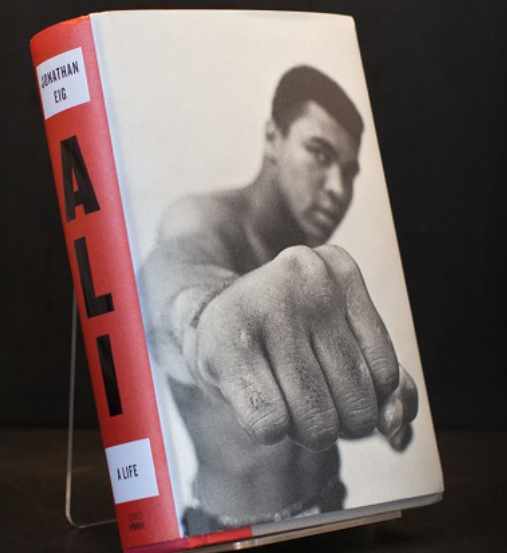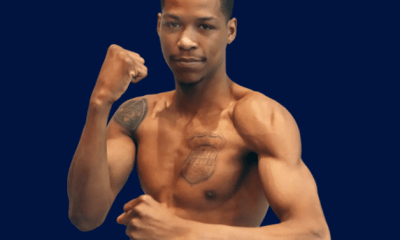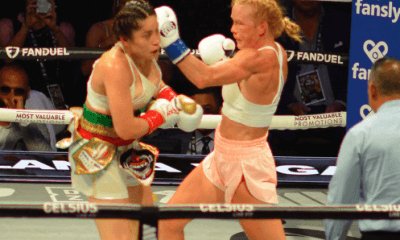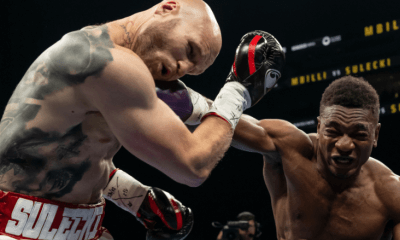Featured Articles
Muhammad Ali Biographer Jonathan Eig Talks About His Book and the Icon Who Inspired It

Given the breadth and depth of Muhammad Ali’s 74 years, it isn’t very easy to capture the complete essence of the man.
Dozens of books have been written about the three-time heavyweight champion including Jonathan Eig’s 2017 biography, “Ali: A Life.”
Born in Louisville, Kentucky on January 17, 1942 as Cassius Marcellus Clay, he would one day be known around the globe as a world-class boxer, civil rights advocate, philanthropist and cultural icon.
Like so many others, the Brooklyn, New York-born Eig became intrigued by Ali.
“I loved Ali as a child. He fascinated me. He was outspoken, radical, yet so very loveable,” he said. “And, of course, he could fight! I was astonished to realize, around 2012, that there was no complete biography of Ali, even though he was probably the most famous man of the 20th century.”
Eig, currently at work on a major offering about the life of Dr. Martin Luther King, Jr., added: “I had read lots of Ali books, including [David] Remnick’s “King Of The World: Muhammad Ali And The Rise Of An American Hero,” and [Thomas] Hauser’s “Muhammad Ali: His Life And Times,” and [Norman] Mailer’s “The Fight” – but those were not complete biographies,” he pointed out. “By 2012, enough time had gone by to put Ali in historical perspective. Also, there were plenty of people still alive to tell the story. I did more than 500 interviews, including all three of Ali’s living wives. I wanted to write a book that would treat Ali as more than a boxer. I wanted to write a book that would show the good and the bad. I wanted to write a big book worthy of an epic life, a book that danced and jabbed half as beautifully as Ali.”
Given Eig’s exhaustive research, what previously unknown tidbits about Ali did he come across?
“I learned thousands of new things. I think even hardcore Ali fans will find new information on almost every page,” said the former Wall Street Journal reporter and 1986 Northwestern University graduate. “I discovered things Ali himself didn’t know. I discovered Ali’s grandfather was a convicted murderer, for example. Ali didn’t know that! I read Ali’s FBI files, as well as those of Herbert Muhammad, Malcolm X and Elijah Muhammad. I interviewed Ali’s childhood friends. I found MRIs of Ali’s brain. I counted the punches from all of his fights. I measured how those punches affected his speaking rate. Ali’s wives also confided in me things I never knew. I spent four years working on this book, and every day delivered revelations.”
Over the years, Ali, who posted a 56-5 ring record with 37 knockouts, seemed to mellow with time which helped ingratiate him to an even wider audience. How was this possible?
“People change. They grow. It’s hard to stay radical as you get older and richer,” said Eig, who has written five books including three that deal with sports. “The late Stanley Crouch had a great line about Ali. He said young Ali was a grizzly bear. Ali in the ’70s was a circus bear. Ali in his later years was a teddy bear. We all loved the teddy bear. We wanted to hug him and love him. But it was the grizzly bear who we should remember first. It was the grizzly bear who shook up the world.”
Sports Illustrated writer Mark Kram covered nearly the entirety of Ali’s career which spanned 1960 through 1981 and included a three-year period, 1967 until 1970 when he wasn’t allowed to box after being convicted of draft evasion because he refused induction into the armed forces.
In Kram’s book, “Ghosts Of Manila,” the author asserts Ali was essentially a pawn of the Black Muslims.
What’s Eig’s take?
“I love Kram’s book, but I think it’s dangerous to question anyone’s religious faith,” he said. “Ali was a true believer. The Nation of Islam took advantage of him at times. But does that mean he was a pawn? I don’t think so. He knew what he was doing. He made his own choices. One might argue that the NOI did more for Ali than Ali did for them.”
Ali wasn’t perfect and that included his fondness for women. As a Muslim, how did he hurdle this?
“He didn’t reconcile it – except to acknowledge that humans are human, they are flawed,” Eig said. “The thing I love about Ali is that he said he was the greatest, but he never said he was perfect. He talked to his wives about his weakness. He even talked to reporters about his flaws – his weakness for women, his disdain for training, his poor handling of money. He knew who he was and he never tried to be anything else.”
Eig, who has also penned “Luckiest Man: The Life And Death Of Lou Gehrig,” and “Opening Day: The Story Of Jackie Robinson’s First Season,” went on: “We’re all complicated, right? Ali was no more complicated than you or me, but he let the whole world see his complications – his racial pride and his racist behavior toward [Joe] Frazier, his love of women and his cruelty to his wives, his generosity with his money and his stupidity with money,” he said. “I don’t think Ali was different, just more open, more willing to let us see everything.”
Ali’s battles with Frazier, George Foreman and Ken Norton are legendary, but his two fights against Sonny Liston are filled with question marks, such as were they fixed?
Ali claimed the title on February 25, 1964 in Miami Beach when Liston failed to answer the bell for the seventh round and then faced Liston 15 months later in Lewiston, Maine, where he knocked out the challenger in the opening frame.
In Eig’s mind, were these two bouts on the level? “My hunch is that the first fight was legit. Liston quit when he knew he couldn’t win,” Eig said. “The second fight is more suspicious. Liston’s flop was pathetic. Bad acting! But I don’t think we’ll ever know for sure. As an aside, Liston’s wife said Sonny had diarrhea before the fight, which might have given him one more reason to throw it.”
Still, Ali in his prime was a sight to behold. “Ali before the exile, in my opinion, was the most beautiful boxer of all time. His combination of speed and power and ferocity was thrilling, elegant, frightening and marvelous,” Eig said. “Was he the greatest heavyweight of all time? Maybe, maybe not. Was he the most breathtaking? To me, yes.”
Early in Ali’s career his braggadocio was off-putting to many. But much of it was showmanship.
“One of the Greatest” doesn’t sound as good, does it? If we’re only discussing his action in the ring, Ali was one of the greatest,” Eig said. “But that’s like saying Louis Armstrong was one of the greatest trumpet players without considering his voice, his charm, his improvisational skills, his smile. In and out of the ring, Ali was the greatest in my book.”
For so many, Ali was many things. What traits in the man does Eig admire? “I love his fearlessness, his honesty, his insatiable appetite for people,” he said. “He was so very loving. But he could also be narcissistic. He wanted everyone to love him, but he wasn’t always sensitive to the feelings of others – including his wives and children. He turned his back on friends like Malcolm X and Joe Frazier when it served his purposes.”
While Ali could be polarizing, he had his legion of supporters including Howard Cosell, Jerry Izenberg, Robert Lipsyte, Larry Merchant and Jack Newfield.
“You could add Mailer, [George] Plimpton, and so many others to that list,” Eig noted. “Those men were lucky enough to spend time with young Ali and to bask in the great warmth of his sun. He was great to reporters. He was the best story they ever covered. And unlike most celebrities, he really paid attention to them.”
Eig continued: “I only met him once, six months before he died, and I envy those reporters who got to know him and got to see him at his best. I think those who knew and loved Ali became his disciples,” he pointed out. “Ali’s friend Gene Kilroy told me over and over that he thought Ali was like Jesus, that people would be studying his words and drawing inspiration from his life for centuries to come. That’s the feeling he gave to those with whom he spent time.”
Ali was a boxer, but so much more. How does Eig see him? “I think Ali will be remembered as one of America’s great revolutionary heroes – one whose courage went far beyond sports. Like Jackie Robinson, like Martin Luther King, like the abolitionists and suffragettes, he loved America but refused to accept its shortfalls,” he said. “He fought to make his country live up to the promises contained in the Declaration of Independence. He will also be remembered as an important world figure, one who united Africans, Americans and Asians, one who helped Americans better understand Islam and helped people of Islamic faith around the world better understand America.”
In Ali’s last quarter century, he was almost universally loved. This is a far cry from being labeled a draft dodger.
“Ali was always a spiritual man, but in his later years I believe he clarified and deepened his spirituality,” Eig said. “He became more focused and more thoughtful.”
When Eig turned in his manuscript, what was his immediate thought? “I wanted to take it back. I didn’t want to be done,” he said. “I had so much fun writing this book I wanted to work on it for the rest of my life. I knew I would never find anything more fun to work on.”
Check out more boxing news on video at the Boxing Channel
To comment on this story in the Fight Forum CLICK HERE
-

 Featured Articles3 weeks ago
Featured Articles3 weeks agoAvila Perspective, Chap. 330: Matchroom in New York plus the Latest on Canelo-Crawford
-

 Featured Articles2 weeks ago
Featured Articles2 weeks agoVito Mielnicki Jr Whitewashes Kamil Gardzielik Before the Home Folks in Newark
-

 Featured Articles4 weeks ago
Featured Articles4 weeks agoAvila Perspective, Chap 329: Pacquiao is Back, Fabio in England and More
-

 Featured Articles3 weeks ago
Featured Articles3 weeks agoOpetaia and Nakatani Crush Overmatched Foes, Capping Off a Wild Boxing Weekend
-

 Featured Articles2 weeks ago
Featured Articles2 weeks agoCatching Up with Clay Moyle Who Talks About His Massive Collection of Boxing Books
-

 Featured Articles4 weeks ago
Featured Articles4 weeks agoFabio Wardley Comes from Behind to KO Justis Huni
-

 Featured Articles1 week ago
Featured Articles1 week agoMore Medals for Hawaii’s Patricio Family at the USA Boxing Summer Festival
-

 Featured Articles4 weeks ago
Featured Articles4 weeks agoDelving into ‘Hoopla’ with Notes on Books by George Plimpton and Joyce Carol Oates





















